Military, dependents find support through JMU VALOR
JMU Headlines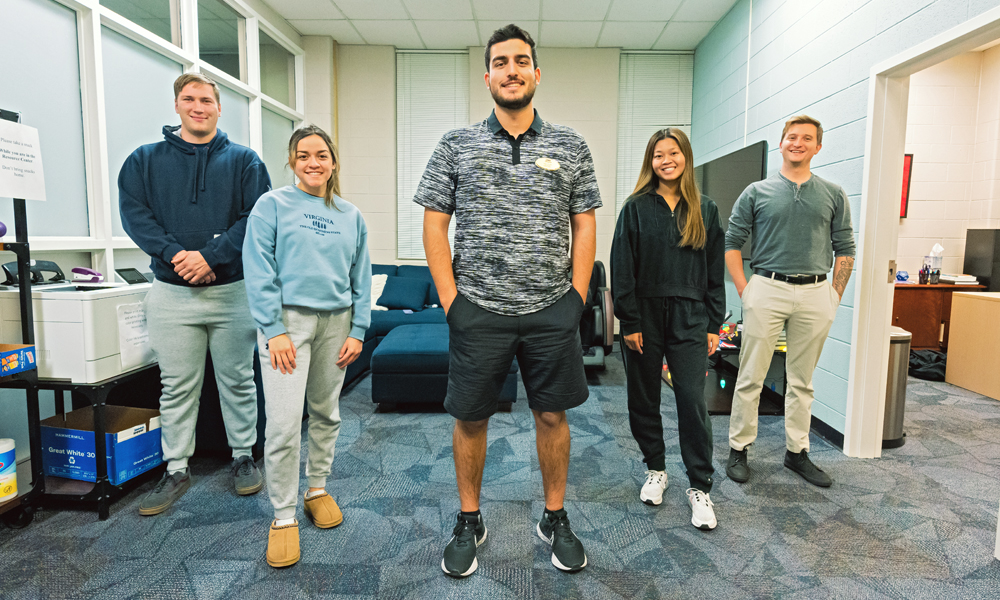
SUMMARY: JMU VALOR provides resources for any military-related person on campus or in the community. Its more than 1,300 members are active military, veterans, ROTC cadets, or family and dependents. Leading up to JMU’s first bowl game on Dec. 23, members of VALOR are excited for this chance to highlight the importance of military and the resources available to them and their families at JMU.
When the JMU football team takes the field Saturday in the Armed Forces Bowl in Fort Worth, Texas, Dukes cheerleader, ROTC cadet and Marine Corps veteran Jonah Posada will be on the sidelines to cheer them on.
Posada said he’s excited to be part of JMU’s first bowl game. “It’s really amazing to see what they’ve accomplished,” he said.
The Dukes’ opponent, Air Force, makes the experience even more meaningful. “I was not expecting JMU to go to a bowl of this caliber and play against Air Force, one of the service academies,” Posada said. “It’s awesome. Hoping that JMU can pull off this win.”
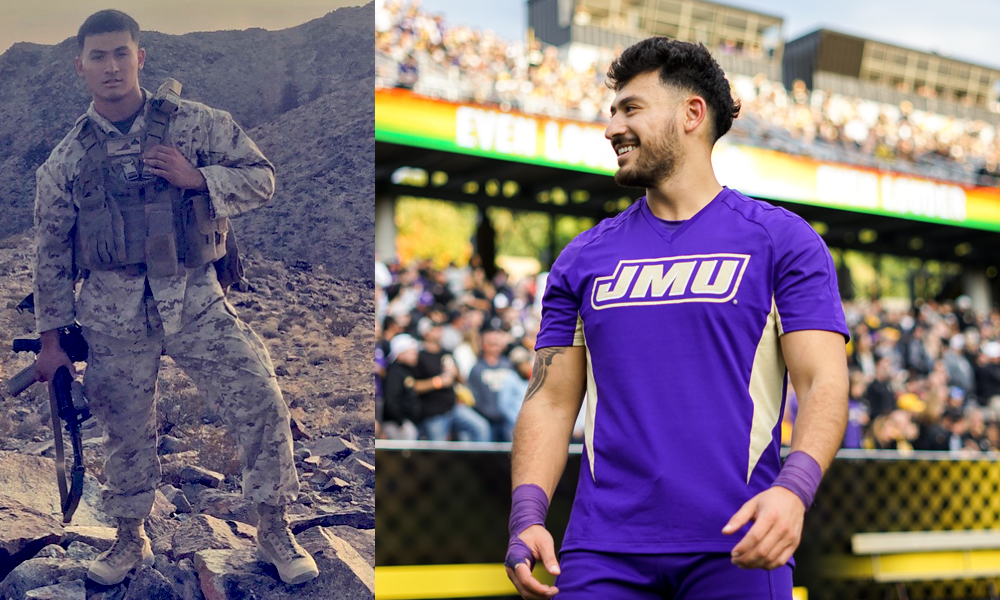
(R): Posada on Zane Showker Field in Bridgeforth Stadium at JMU, where he’s a cheerleader.
PHOTOGRAPHS COURTESY OF JONAH POSADA
Posada, who was on his high school football, track and wrestling teams, joined JMU Cheerleading because they were scouting for men to join the squad and it was a way for him to continue to be athletic during his college career.
“I’ve always enjoyed being part of a team or a group,” he said. “I’ve kind of had that fulfilled my whole life.”
Cheering and being a Marine require some similar skills, like trust and teamwork, to ensure everyone’s safety, he said.
“[I]n the Marines, we’re not doing this for ourselves, we’re doing it for the Marine to the right and left of us … to make sure that they’re safe. You kind of put yourself last.”
As a base cheerleader, Posada is tasked with keeping the “flyer” from getting injured during an aerial stunt. Likewise, she needs to fall in a way that won’t injure him. “It’s a lot of trust all the way around,” he said. “You kind of learn how to look out for each other in that aspect.”
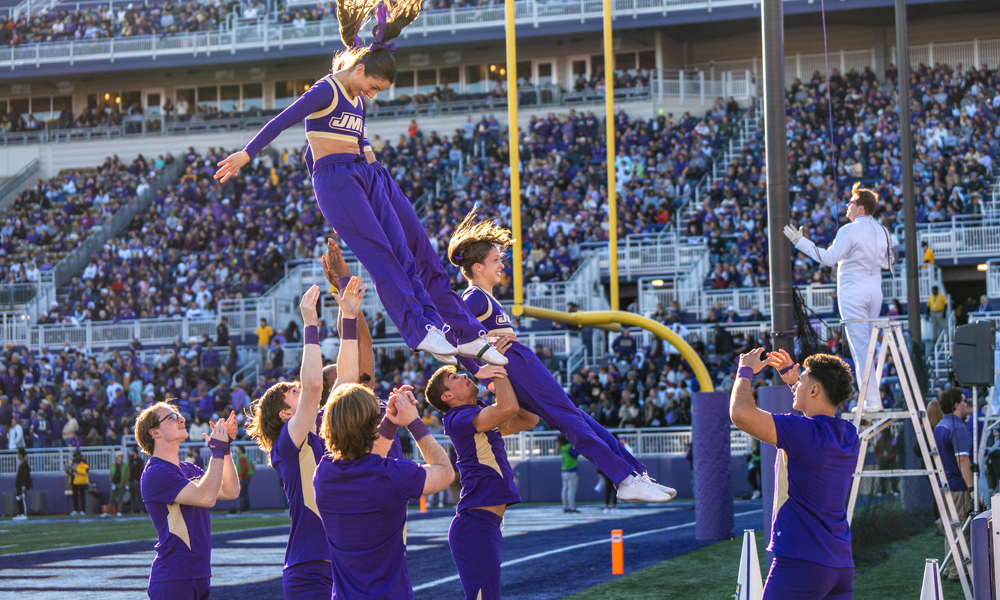
PHOTOGRAPH BY RACHEL HOLDERMAN
Joining the Marines out of high school, Posada worked in communication — networking and programming switches and routers in Okinawa, Japan. Later, he equipped artillery with radios in Camp Lejeune, North Carolina.
After serving a combined four years, he came to JMU to study Kinesiology with a minor in Physical Therapy. Now in the Army National Guard, Posada is in his fourth year academically but will need a fifth year to complete his ROTC classes. He hopes to pursue a career in physical therapy and accept a commission with the Army.
Posada appreciates the resources that JMU offers veterans and their families. “It’s been helpful and very veteran-friendly,” he said.
The main support system for all military-connected students, staff and community members on campus is the VALOR Resource Center. Located in Taylor Hall, Room 106, the center provides resources to any active military, veteran, ROTC cadet, or their family and dependents. With more than 1,300 members, VALOR works closely with the Virginia Department of Veterans Services, which has an office in the resource center.
|
“It could have been a random bowl. To have a bowl that has a meaning beyond the fact that we get to compete … it says a lot.” — Tim Miller, VP of Student Affairs |
“The military is about community,” said Tim Miller, vice president of Student Affairs, which oversees JMU VALOR. Providing a place where veterans, active military, and their families can connect with each other and access benefits is what the staff and volunteers at VALOR aim to cultivate through their efforts.
When JMU VALOR started in 2022, it was mainly for veterans, Miller said, but it quickly became clear that military dependents should benefit too. Military families make sacrifices for their country, he said, and they need to know what resources are available for them. After opening their doors to families and dependents, VALOR’s membership increased dramatically. So many “have now found a community that they never had before,” Miller said. “We’ve been able to welcome and serve more people. That means a lot.”
Other campus resources for military-connected people include JMU ROTC and the JMU Student Veterans Association.
In 2019, College Factual recognized JMU as the best college in the U.S. for veterans, and in November, JMU was featured on Military Makeover.
About a year before VALOR’s membership took off, Coast Guard veteran Jacob “Jake” Nadler (’22M) contacted the SVA to learn what resources were available to him. At the time, the SVA’s membership was down, which he attributed to the COVID-19 pandemic. But he and some other students got it back off the ground with Miller’s help.
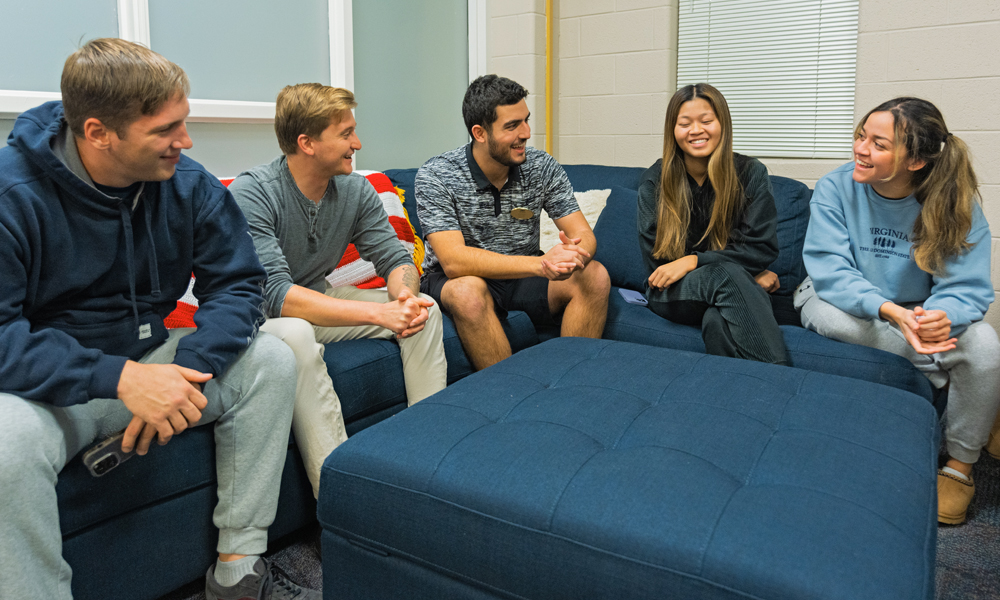
PHOTOGRAPH BY STEVE ADERTON (’19)
Nadler, now SVA vice president, is in the inactive Coast Guard Individual Ready Reserve. He plans to graduate from JMU in August 2024 with an Education Specialist degree for School Psychology. At VALOR, he’s seen military-connected people access Veterans Affairs benefits, get help writing resumés, gain access to mental health services and connect with others around the community.
VALOR is more than just four walls, Nadler said. “It's got really good potential to be that foundation for people to come in [and] know they have that space. I think the potential for growth that VALOR has, they’re just going to keep outdoing themselves each year.”
John Jornlin (’23), graduate assistant and coordinator of VALOR, said his experience as a dependent who moved around a lot throughout his childhood gives him a perspective that other dependents can relate to when they visit VALOR. “It’s a great thing to offer,” he said. “To be able to help others is the biggest reward for me.”
|
“To be able to help others is the biggest reward for me.” — John Jornlin (’23), JMU VALOR coordinator |
Jornlin was about 5 years old in 2006 when he lost sight of his mother as he and his family were fleeing Lebanon following an Israeli invasion. All alone, he found a friend in a soldier who was helping with the evacuation and who reunited Jornlin with his mother, aunt and cousins on their way to Cyprus and, eventually, Italy.
“I was rescued from a moment of panic by someone in the military,” Jornlin recalled. If not for that soldier, he said, “who knows what would have happened.” Since that day, the military has become “very tied to a piece of who I am.” As a result, Jornlin has devoted himself to helping veterans.
His father, Phil (’75, ’76M), also had a big influence on him, having attended Virginia Military Institute before signing on for two tours of duty in Vietnam with the U.S. Navy. Now he’s working his second stint as a diplomat with the U.S. State Department in Vietnam.
“He did his master’s here, and I’m also doing my master’s here,” Jornlin said.
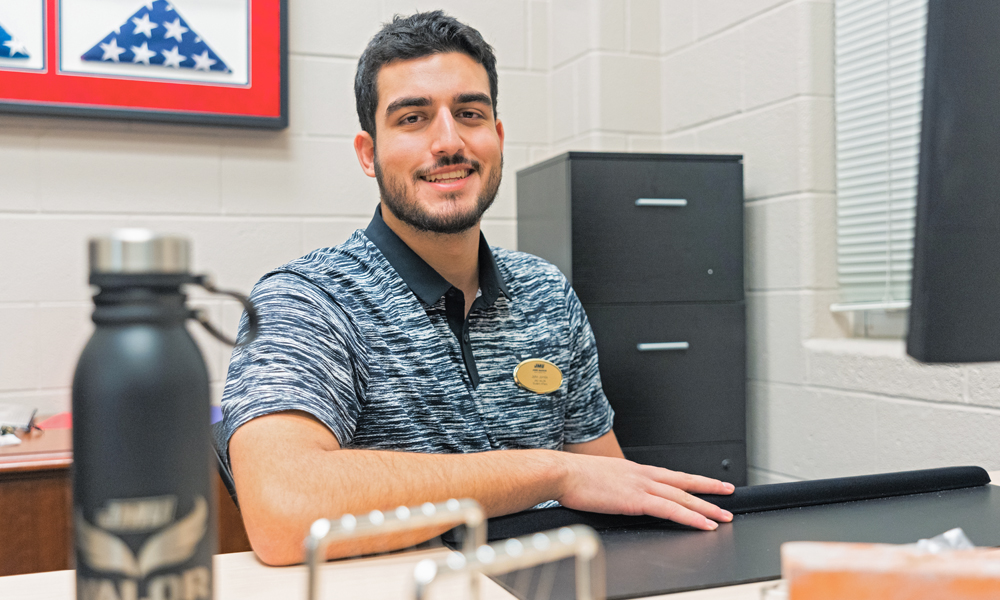
PHOTOGRAPH BY STEVE ADERTON (’19)
His father double-majored in Political Science and Geography before earning a master’s in Higher Education Administration. Jornlin also earned a bachelor’s in Political Science with a minor in Geographic Studies and is studying for a Master’s in Public Administration. But while their education is similar, their Madison Experiences are very different.
The elder Jornlin attended college on the GI Bill of Rights. He was an older student and didn’t feel as connected to his fellow classmates. Also, at the time, there wasn’t as much support for veterans on campus as there is today.
More than 40 years later, his son wasn’t sure what resources he might find at Madison for military families, but after learning about JMU VALOR, he signed up and has since become a staff member alongside Miller so he can help other dependents.
“I think that would have been a big help for him when he was younger,” Jornlin said of his father. “When I help others, it’s kind of like helping my dad. It’s also helping me.”
Miller said the Armed Forces Bowl is a unique opportunity for JMU.
“It could have been a random bowl,” he said. “To have a bowl that has a meaning beyond the fact that we get to compete … it says a lot.”

